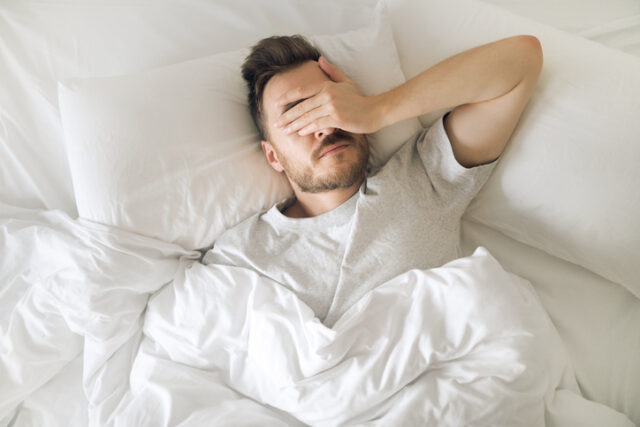Getting enough sleep and getting deep, restorative rest are definitely not the same thing.

You might be spending eight hours in bed, but if you’re constantly waking up groggy, struggling to focus, or feeling drained all day, your sleep quality could be the problem. Deep rest is when your body and mind truly recover, allowing you to wake up feeling refreshed instead of just surviving on caffeine. If you’re not getting the kind of rest you actually need, here are some warning signs to watch out for.
1. You wake up feeling just as tired as when you went to bed.

If you’re getting a full night’s sleep but still waking up feeling exhausted, your body isn’t reaching deep rest. This usually means you’re spending too much time in light sleep stages and not enough in the deeper phases where true recovery happens. Tossing and turning, stress, or poor sleep habits could be stopping you from getting the kind of rest that actually recharges you. Good sleep should leave you feeling at least somewhat refreshed. If you wake up feeling like you never slept at all, it’s a major red flag that something is off with your sleep quality.
2. You rely on caffeine just to feel normal.

There’s nothing wrong with enjoying a morning coffee, but if you physically can’t function without it, you might not be getting the deep rest your body needs. When sleep is truly restorative, your energy levels naturally reset overnight, meaning you shouldn’t need caffeine just to get through the day. If you’re constantly reaching for coffee, energy drinks, or sugar boosts, your body is likely trying to compensate for poor-quality sleep. Caffeine can mask tiredness, but it doesn’t fix the underlying problem. If you always feel like you’re running on empty, it’s time to look at how well you’re actually resting.
3. Your brain feels foggy throughout the day.

Struggling to concentrate, forgetting simple things, or feeling like your brain is running in slow motion are all signs that your sleep isn’t doing its job. Deep rest is when your brain processes information, clears out toxins, and resets for the next day. Without it, even the simplest tasks can feel mentally exhausting. If your focus constantly feels off or you’re making silly mistakes, lack of quality rest could be to blame. A well-rested brain should feel sharp and alert, not sluggish and scattered.
4. Your mood is all over the place.

Poor sleep has a direct impact on mood, making you more irritable, anxious, or emotional than usual. When you don’t get enough deep rest, your brain struggles to regulate emotions properly, meaning small annoyances feel like huge problems. If you find yourself snapping at people, feeling unusually down, or struggling with stress more than normal, your sleep could be playing a bigger role than you realise. Good sleep helps keep emotions balanced, making it easier to handle daily challenges. If everything feels overwhelming, improving your sleep quality might make a bigger difference than you expect.
5. You regularly wake up during the night.

Even if you’re in bed for the right number of hours, frequent wake-ups can prevent you from getting deep, uninterrupted rest. Every time you wake up, your body has to start the sleep cycle over again, meaning you spend less time in the deeper stages of sleep where real recovery happens. Whether it’s from stress, discomfort, or an inconsistent bedtime routine, these disruptions add up. Waking up occasionally is normal, but if it happens regularly and leaves you feeling unrested, your sleep isn’t working as well as it should be. The goal is long, uninterrupted sleep that lets your body go through all the necessary stages properly.
6. You feel physically drained, even if you’re not doing much.

When your body doesn’t get enough deep rest, it doesn’t fully recover from the previous day, leaving you feeling physically tired even after minimal effort. Tasks that should feel easy — like walking upstairs or carrying groceries — might suddenly seem exhausting. Your muscles and joints might even feel sore, as if you’ve done a heavy workout when you haven’t. Deep sleep is when your body repairs itself, so without it, you end up feeling run down. If you’re constantly low on energy without a clear reason, poor sleep quality could be behind it.
7. Your skin looks dull or tired.

They don’t call it “beauty sleep” for nothing — deep rest plays a big role in skin repair and overall appearance. If your sleep quality is poor, your skin might look dull, puffy, or more tired than usual. Dark circles, dryness, or breakouts can also be linked to lack of proper rest. Your body does a lot of repair work overnight, including producing collagen and flushing out toxins. If you’re not getting enough deep sleep, your skin is missing out on that nightly refresh.
8. You get sick more often.

Deep rest is essential for a strong immune system. If you’re constantly catching colds or feeling run down, your sleep quality might be making you more vulnerable to illness. Your body uses deep sleep to fight infections, repair cells, and keep your immune defences strong. Without enough quality rest, your body struggles to recover properly. If you find yourself frequently unwell, improving your sleep could help strengthen your overall health.
9. You feel unusually hungry or crave junk food.

Poor sleep affects hunger hormones, making you more likely to crave sugar, carbs, and high-fat foods. When you don’t get enough deep rest, your body produces more ghrelin (the hunger hormone) and less leptin (the hormone that signals fullness). This can leave you constantly snacking, even when you’re not actually hungry. Good sleep helps regulate appetite and cravings. If you’re always reaching for unhealthy snacks, lack of proper rest might be making it harder to control your eating habits.
10. You struggle to get out of bed in the morning.

Waking up groggy and struggling to get moving no matter how long you slept is a sign that you’re not getting enough deep rest. When sleep is truly restorative, waking up should feel natural, not like an impossible task. If you feel like you could sleep for hours more, your body is telling you something’s missing. Getting out of bed shouldn’t feel like a daily battle. Deep sleep helps you wake up refreshed and ready to start the day without dragging yourself out of bed.
11. Your motivation feels nonexistent.

If everything feels like too much effort, lack of proper rest could be draining your motivation. When your brain and body aren’t fully recharged, even simple tasks can feel overwhelming. You might struggle to start things, procrastinate more than usual, or feel like you just don’t have the energy to care. Deep rest is what keeps you feeling motivated and engaged. If you constantly feel unproductive or unmotivated, fixing your sleep could be the key to getting back on track.
12. You rely on naps but still feel tired.

Naps can be useful, but if you’re taking them regularly and still feeling exhausted, it’s a sign your sleep quality isn’t cutting it. Short naps should help refresh you, but if you wake up from them feeling just as groggy, your body isn’t getting the deep rest it needs. Relying on naps to function is a sign that your nighttime sleep isn’t doing its job. Instead of relying on naps, focusing on improving the quality of your main sleep can make a bigger difference. Deep rest overnight means needing fewer energy boosts throughout the day.
13. Your stress levels feel higher than usual.

Poor sleep and high stress go hand in hand. If everything feels more overwhelming than it should, your lack of deep rest could be making it harder to cope. Sleep is when your body resets stress hormones — without enough of it, your anxiety and stress levels can spiral. Getting quality sleep helps you handle daily challenges with more ease. If you’re feeling constantly on edge, fixing your rest could help you feel calmer and more in control.




